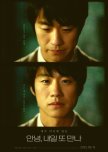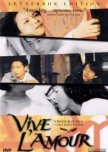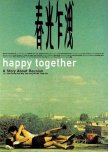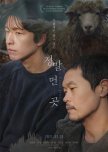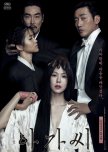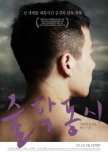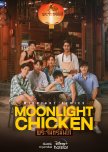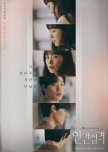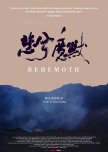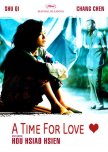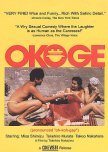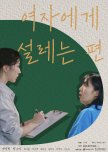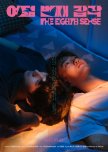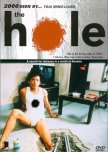Great Queer & LGBTQ-Themed Films
Here are some feature-length films which excel as art and have interesting, meaningful, and nuanced stories about (or related to) queerness (and/or being queer as an Asian person) and/or offer a queer(ing) critique in their ideas/aesthetics/formal structure/etc. I align each film along Scott McCloud's artistic "campfires" (classicist, animist, iconoclast, formalist). All films on this list are also placed into my BL alignment chart, which organizes entries by thematic focus.
I'd also include the following films not on MyDramaList:
- Everything Everywhere All At Once (2022) with a rating of 10: hilarious, irreverent, badass action film driven by the relationship between a mother and her queer daughter. Animist with classicist tendencies.
- Goodbye Mother (2019) with a rating of 9.5: a quiet and beautiful story about family, transnational queerness, and love. Animist with classicist tendencies.
- Saving Face (2004) with a rating of 9: hilarious romcom about family acceptance. Animist.
For an analogous list of drama series, see my S tier of LGBTQ & BL series. Various films which I am planning to watch as candidates to add to this list are in my watch queue.
Films in this list are ordered by greatness, where "great" should be understood as how much I personally appreciate the existence of that film as a work of art, and "great" is understood as a separate (more exclusive category) than just "good":
-
1. So Long, See You Tomorrow
Korean Movie - 2021
An introspective and melancholic (yet ultimately hopeful) slow-burn which reflects on the choices we face and the journeys we might take to repair our relationships with ourselves, our families, and our pasts - even if the journey takes twenty-five years and is haunted by regret. Just like my all-time favorite film Everything Everywhere All At Once (2022), this film takes a question I often thought about, "what would my life have been like in a parallel universe?", as the departure point for a really beautiful and powerful story. And while the story - like Your Name Engraved Herein (2020) - begins with a life-changing interrupted first-love during high school, its emphasis is instead on the textures of life after such a romance and on the paths to self-acceptance and closure after the drama of adolescence.
Animist with slight classicist tendencies.
Recommended reviews/analysis:
-
2. Querido Ex
Taiwanese Movie - 2018
A painful, melancholic, heartfelt, healing, and hilarious dramedy about love, illness, death, grief, and kinship in a heterosexist society. This beautiful film interrogates what it means to be a family.
Animist with classicist tendencies.
Recommended reviews/analysis:
-
3. Vive L'Amour
Taiwanese Movie - 1994
An austere art-house meditation on urban loneliness and isolation as it follows three characters, one of whom is queer, who inhabit the same space as two parallel worlds.
Iconoclast and classicist.
Recommended reviews/analysis:
- https://www.cinemaescapist.com/2014/12/review-vive-lamour-taiwan-1994/
- https://www.filminquiry.com/vive-lamour-1994-review/
- https://www.youtube.com/watch?v=9AVi7bAp5yk
- https://www.moviejawn.com/home/2022/3/18/with-a-new-restoration-vive-lamour-offers-perspective-on-tsais-career-long-exploration-of-lonely-souls
- https://www.cinemaasweknowit.com/reviews/vivelamour
- https://www.filmcomment.com/blog/queer-now-then-1994-2015/
- https://reverseshot.org/symposiums/entry/323/vive_lamour
-
4. Roda do Destino
Japanese Movie - 2021
The third - and, in my opinion, most compelling - vignette in this intriguing triptych of conversational poems stages a spontaneous meeting between two friends (or, perhaps, strangers?): a middle-aged woman who has lived with regrets about the things she didn't say to an ex-girlfriend at the end of their relationship, and a middle-aged woman whose life is now structured in large part by her role as a housewife. The remarkably intimate conversation they have playfully explores the keeping & disclosure of secrets, the slippage between artifice and authenticity in our performance of roles, the value of memory and forgetting, and the joy of connection and friendship.
Classicist with slight animist tendencies.
Recommended reviews/analysis:
- https://www.fourkents.com/blog/wheel-of-fortune-and-fantasy-review-ryusuke-hamaguchi
- https://www.rogerebert.com/reviews/wheel-of-fortune-and-fantasy-2021
- https://www.indiewire.com/criticism/movies/wheel-of-fortune-and-fantasy-review-1234621297/
- https://www.autostraddle.com/wheel-of-fortune-and-fantasy-review/
- https://www.brightwalldarkroom.com/2022/03/14/so-much-depends-upon-an-open-door/
-
5. Happy Together
Hong Kong Movie - 1997
This (surprisingly nostalgic) recollection of the slow-motion ending and aftermath of a toxic relationship beautifully explores queer diasporic loneliness and homesickness, yearning and melancholia, (self-)exile and return, and the relationship between fantasy and mundane reality.
Formalist and classicist.
Recommended reviews/analysis:
- https://www.theasiancut.com/post/happy-together-movie-review-wong-kar-wai
- https://www.theparisreview.org/blog/2019/09/03/the-brief-idyll-of-late-90s-wong-kar-wai/
- https://lwlies.com/articles/wong-kar-wai-happy-together-bitter-romanticism/
- https://www.taylorfrancis.com/chapters/edit/10.4324/9780203165195-24/nostalgia-new-wave-structure-wong-kar-wai-happy-together-happy-together-rey-chow
- https://www.sensesofcinema.com/2000/cteq/happy/
- https://film-cred.com/happy-together-at-25-toxic-romance-in-the-face-of-displacement/
- https://digital.lib.washington.edu/researchworks/handle/1773/44191
-
6. A Distant Place
Korean Movie - 2020
A subtle, beautiful, and poetic slow-burn which covers similar narrative and thematic ground as His (2020) in its depiction of small-town queerness and its exploration of what constitutes a family - but which also explores alternative kinship ties in more depth; and which resonates with So Long, See You Tomorrow (2021)'s observation of the sacrifices involved in self-exile as a mode of escape. But this quiet drama has a more brutal representation of homophobia and its consequences, a bleaker tone, and a more artistically-distinctive execution.
Classicist and animist.
Recommended reviews/analysis:
-
7. A Criada
Korean Movie - 2016
This stunningly polished and stylish revenge thriller (and occasional dark comedy) retells (from the perspective of the two queer women leading this show) the story of how they overturned and escaped from heteropatriarchal and colonial masculinity and sexual abuse by subverting their compromised social positions in 1930s colonized Korea & Japan. There is controversy over the sexual politics of the erotic lesbian sex scenes as grounded in [hetero] male fantasy + gaze, and those scenes weren't enjoyable for me, a Known Gay (though there were moments that my gayze was drawn to Count Fujiwara, pls don't at me); however, I believe the film critically questions [attentive] viewers about the always-already compromised context of the lesbian sex scenes by drawing attention to the characters' deliberate performance/appropriation of these tropes (in a way that is similar to how drag artists perform gender via queerly excessive mimicry of viewers' expectations about how gender works).
Animist and classicist.
Recommended reviews/analysis:
-
8. Kaibutsu
Japanese Movie - 2023
A bleak, harrowing indictment of the failure/inability of adults to protect queer children from abuse at the hands of other children and adults, and of how society constructs monsters out of people and throws away people like so much garbage. This is also a film about queer themes of truth, silence, and interpretation/misreading/misrecognition in our construction of stories about people; about the mundanity of violence, of complicity in abuse, and of heterosexism; and about the loneliness of existing under such conditions.
The film has some interesting thematic resonances with All Shall Be Well (2024) in its treatment of issues of truth and understanding. It's kind of like Your Name Engraved Herein (2020) in the emotions it evoked for me, but with a more restrained approach to building those emotions, more complex themes, and a more nuanced concept.Animist with slight classicist tendencies.
Recommended reviews:
-
9. Lua Cheia
Korean Movie - 2019
This restrained, beautiful, and gentle slow-burn subtly explores intergenerational familial relationships, secrets, romantic love, (re)connection, and loneliness in the context of the roundabout life journeys queer women might take to return to their true selves and heal from the lasting impacts of growing up under heterosexism and patriarchy.
Animist and classicist.
Recommended reviews/analysis:
-
10. Egoist
Japanese Movie - 2022
A quietly devastating film about yearning for love and family, about death and grief, about still choosing to love despite the inevitability of loss - so this film inhabits a similar thematic space as Dear Ex (2018), but from a different and complementary angle. This film also raises open-ended questions about class and the ethics of giving/receiving money in social relationships.
Animist with slight classicist tendencies.
Recommended reviews/analysis:
-
11. Funeral Parade of Roses
Japanese Movie - 1969
This transgressive - and at turns unsettling, slapstick, and shocking - avant-garde fever dream of a film documents a very queer mode of gender and sexuality among gei bōi (which we in the US might read as transfeminine) characters in the underground of 1960s Shinjuku. The fragmentary result is a fascinating queering/questioning of the construction, performance, and reading of identity.
Iconoclast and formalist.
Recommended reviews/analysis:
- https://www.bfi.org.uk/features/why-funeral-parade-roses-landmark-japanese-queer-cinema
- http://www.notcoming.com/reviews/funeralparadeofroses/
- https://substreammagazine.com/2017/11/funeral-parade-roses/
- https://asianmoviepulse.com/2020/12/film-review-funeral-parade-of-roses-1969-by-toshio-matsumoto-3/
- https://www.ceeol.com/search/article-detail?id=975819
- https://academic.oup.com/screen/article/52/3/376/1687771
-
12. The Wedding Banquet
Taiwanese Movie - 1993
This hilarious (as in, ha ha deadly serious) comedy of errors plays with (and contains a critique of) themes of patriarchy, filial piety, coercion, transnational mobility, reputation, tradition, secrets, language, and Asian-Americanness.
Animist with slight classicist tendencies.
Recommended reviews/analysis:
-
13. Stateless Things
Korean Movie - 2012
This indie film tells a raw, unsettling, and rather subtle story critiquing the precarious and dehumanizing conditions of existence at the social margins of South Korea. Much of this critique may require insider contextual knowledge about the spatial history of Seoul's urban development processes to understand - see my second link in the list of recommended reviews/analysis.
Iconoclast.
Recommended reviews/analysis:


